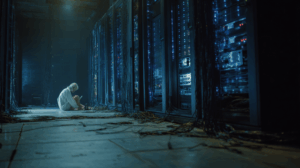
Show Summary
On this Reality Roundtable, philosopher and writer Dougald Hine, social scientist and farmer Chris Smaje, and ecologist and farmer Pella Thiel join Nate to discuss the future of food and community. Our disconnected relationship to agriculture and our neighbors have been shaped by a modern industrial society fueled by surplus hydrocarbon energy. What will these relationships look like in a lower energy future, where we need to once again work with each other and the land, rather than in isolation. Can we learn from history to celebrate with each other in times of abundance and find strength in community in times of need? In the present world where people are in constant search for meaning and purpose, what are strategies to find joy in simplicity and well-being through the growing and sharing of food?
About Dougald Hine
Dougald Hine is a social thinker, writer and speaker. After an early career as a BBC journalist, he co-founded organizations including the Dark Mountain Project and a school called HOME. His latest book is At Work in the Ruins: Finding Our Place in the Time of Science, Climate Change, Pandemics & All the Other Emergencies (2023). He co-hosts The Great Humbling podcast and publishes a Substack called Writing Home.
For more information: www.dougald.nu
About Chris Smaje
Chris Smaje is a writer, social scientist and small-scale farmer, co-running a mixed holding in Somerset, southwest England. He’s the author of A Small Farm Future (2020) and Saying NO to a Farm-Free Future (2023), both published by Chelsea Green. He blogs at and is contactable via www.chrissmaje.com.
About Pella Thiel
Pella Thiel is a maverick ecologist, part-time farmer, full-time activist and teacher in ecopsychology. She is the co-founder of swedish hubs of international networks like Swedish Transition Network and End Ecocide Sweden and a knowledge expert in the UN Harmony with Nature programme. Pella was awarded the swedish Martin Luther King Award in 2023 and the Environmental Hero of the year 2019.
For more information: https://pellathiel.se/about-me/
In French, we have a motto that says that a simple drawing is often better than a long explanation. Jean-Marc Jancovici Carbone 4 President
That’s very understandable because with left atmosphere thinking, one of the problems is that you see everything as a series of problems that must have solutions. Iain McGilchrist Neuroscientist and Philosopher
We can’t have hundreds and hundreds of real relationships that are healthy because that requires time and effort and full attention and awareness of being in real relationship and conversation with the other human. Nate Hagens Director of ISEOF
This is the crux of the whole problem. Individual parts of nature are more valuable than the biocomplexity of nature. Thomas Crowther Founder Restor
Show Notes & Links to Learn More
Download transcript00:00 – Dougald Hine works and info, Chris Smaje works and info, and Pella Thiel works and info
08:12 – Frederico Campagna
20:04 – La Via Campesina: The Global Peasant Movement
21:52 – The Triangle of Sadness
25:22 – The Potato Appeal
25:45 – The Potato Uprising
31:03 – Dark Mountain, Space Makers
36:05 – Paul Richards
43:17 – Paul Kingsnorth
45:31 – Many people think today’s generations will be worse off than the previous
46:19 – Hospicing Modernity– Vanessa Machado de Oliveira
50:55 – Health issues in modernity
54:28 – Restoring Palm Oil Plantations
57:50 – Food Sovereignty movement in Jordan
1:08:49 – Ivan Illich
1:18:41 – Ecocide, The Rights of Nature
1:25:50 – Chelsea Green
1:26:05 – Ed Gillespie




